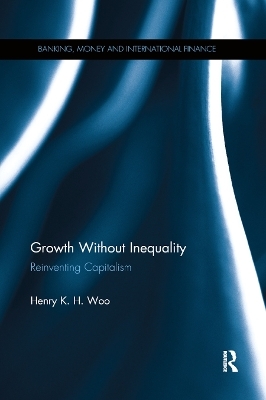
Growth Without Inequality
Reinventing Capitalism
Seiten
2019
Routledge (Verlag)
978-0-367-88696-7 (ISBN)
Routledge (Verlag)
978-0-367-88696-7 (ISBN)
Many years on after the 2007-8 financial crisis, most developed nations still find themselves in a state of weak recovery, high debt pile-up and distributive disparity. This book attempts to address this issue and to provide a pragmatic solution. By offering a unified framework of factors that drive growth, it shows how growth also gives rise to
Many years on after the 2007–8 financial crisis, most developed nations still find themselves in a state of weak recovery, high debt pile-up and distributive disparity. The intriguing question that we face is whether the golden days of modern capitalism are over, or if capitalism is just undergoing another period of adjustment characteristic of its past. What is disheartening is that the twin economic goals of sustainable growth and equality, which the world has now come to recognise as of paramount importance but mutually conflicting, remain, more now than ever, illusive and unattainable.
Growth Without Inequality attempts to address this issue and to provide a pragmatic solution especially for nations in the current policy gridlock. By offering a unified framework of factors that drive growth, it shows how growth also gives rise to an array of "anomalous market forms" (defined by different degrees of value and risk visibility) that subvert distributive equity between labour and capital. It debunks both the pure free market solution and the mixed economy approach on the ground that they fail to arrest the growth propelling yet subversive power inherent in the "corporate forms" under the present capitalistic regime.
Having shown that effective reform can hardly take place within the system itself, this book proposes to build a separate sector (Economy II) and partition it from the existing system (Economy I). The solution is easy to implement and quick to take effect. By one single stroke, this "Non-Marxist" solution can happily achieve the ideals of both "competitive capitalism" and "egalitarian socialism".
Many years on after the 2007–8 financial crisis, most developed nations still find themselves in a state of weak recovery, high debt pile-up and distributive disparity. The intriguing question that we face is whether the golden days of modern capitalism are over, or if capitalism is just undergoing another period of adjustment characteristic of its past. What is disheartening is that the twin economic goals of sustainable growth and equality, which the world has now come to recognise as of paramount importance but mutually conflicting, remain, more now than ever, illusive and unattainable.
Growth Without Inequality attempts to address this issue and to provide a pragmatic solution especially for nations in the current policy gridlock. By offering a unified framework of factors that drive growth, it shows how growth also gives rise to an array of "anomalous market forms" (defined by different degrees of value and risk visibility) that subvert distributive equity between labour and capital. It debunks both the pure free market solution and the mixed economy approach on the ground that they fail to arrest the growth propelling yet subversive power inherent in the "corporate forms" under the present capitalistic regime.
Having shown that effective reform can hardly take place within the system itself, this book proposes to build a separate sector (Economy II) and partition it from the existing system (Economy I). The solution is easy to implement and quick to take effect. By one single stroke, this "Non-Marxist" solution can happily achieve the ideals of both "competitive capitalism" and "egalitarian socialism".
Henry K. H. Woo is an economic methodologist. He is the founder of the International Network for Economic Method and the Founding Chairman of the Hong Kong Institute of Economic Science. Apart from researches on economic theory and methodology, he also publishes widely on cultural studies, China’s economy, political and educational issues.
Part I Diagnosis
1 Growth and Its Drivers
2 Growth and Its Consequences
Part II Solution
3 The Vain Search for Solution
4 The NPV Model and Economy II
5 Growth Without Inequality
| Erscheinungsdatum | 16.12.2019 |
|---|---|
| Reihe/Serie | Banking, Money and International Finance |
| Verlagsort | London |
| Sprache | englisch |
| Maße | 156 x 234 mm |
| Gewicht | 453 g |
| Themenwelt | Wirtschaft ► Allgemeines / Lexika |
| Wirtschaft ► Betriebswirtschaft / Management ► Finanzierung | |
| Wirtschaft ► Betriebswirtschaft / Management ► Rechnungswesen / Bilanzen | |
| Betriebswirtschaft / Management ► Spezielle Betriebswirtschaftslehre ► Bankbetriebslehre | |
| Wirtschaft ► Volkswirtschaftslehre ► Makroökonomie | |
| Wirtschaft ► Volkswirtschaftslehre ► Wirtschaftspolitik | |
| ISBN-10 | 0-367-88696-0 / 0367886960 |
| ISBN-13 | 978-0-367-88696-7 / 9780367886967 |
| Zustand | Neuware |
| Haben Sie eine Frage zum Produkt? |
Mehr entdecken
aus dem Bereich
aus dem Bereich
warum unser Geld stirbt und wie Sie davon profitieren
Buch | Hardcover (2024)
FinanzBuch (Verlag)
CHF 41,95
denken und handeln wie ein professioneller Trader
Buch | Softcover (2023)
Vahlen, Franz (Verlag)
CHF 51,65


